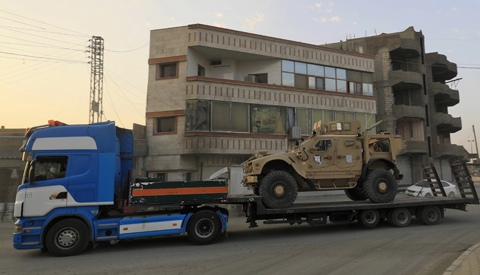In final stages of capturing stronghold
 RAQA: A military convoy composed of 140 trailers used to carrying US-made armoured vehicles, bulldozers, and arms, through Simalka border crossing between Syria and Iraqi Kurdistan, and headed for SDF forces fighting. —AFP
RAQA: A military convoy composed of 140 trailers used to carrying US-made armoured vehicles, bulldozers, and arms, through Simalka border crossing between Syria and Iraqi Kurdistan, and headed for SDF forces fighting. —AFPBEIRUT: US-backed fighters have seized 90 percent of Raqa from the Islamic State group, a monitor said yesterday, as they announced they were in the "final stages" of capturing the jihadists' Syrian stronghold. Under siege in the northern city for three months, IS is struggling to defend its one-time bastion under a barrage of air strikes by the US-led coalition battling the jihadists in Syria and Iraq.
"Because of the heavy coalition air strikes, IS withdrew from at least five key neighborhoods over the past 48 hours," said Rami Abdel Rahman, head of the Britain-based Syrian Observatory for Human Rights. "This allowed the Syrian Democratic Forces to control 90 percent of the city." The SDF is an alliance of Kurdish and Arab forces the coalition is backing in Syria with air strikes, equipment and advisers.
IS pulled out of the north of the city and abandoned its grain silos and mills, Abdel Rahman said. It was now confined to the city centre, in government administrative buildings, the stadium and tunnels. The SDF said its forces had mounted a "surprise attack" on IS in the north of the city. "We consider this the final stages of the Wrath of the Euphrates campaign, which is nearing its end," a statement said.
IS seized Raqa in early 2014, transforming the city into the de facto Syrian capital of the "caliphate" it declared after taking control of large parts of Syria and Iraq. It quickly became synonomous with the group's most gruesome atrocities, including public beheadings, and IS is thought to have used the city to plan attacks abroad.
'Not resist much longer'
The SDF spent months encircling the city before entering it in June and sealing off all access routes. Abdel Rahman said the siege had worn down IS's defensive capabilities. "After hundreds of their fighters were killed in recent weeks, the remaining IS fighters will not be able to resist much longer in Raqa as their military equipment and basic necessities are dwindling," he said.
Without food or medical equipment, IS was unable to treat its own wounded and had retreated to the city centre, which it considered "the most secure," he said. But the battle for the 10 percent of the city still held by IS is likely to be tough, as the jihadists have heavily mined the area, Abdel Rahman said. IS has used mines, snipers, car bombs, and weaponized drones against the SDF offensive. Tens of thousands of civilians have fled the fighting in recent months. Estimates of the number still inside the city range from fewer than 10,000 to as many as 25,000. In its statement yesterday, the SDF said it had helped hundreds of civilians escape the city in recent days. "We will continue the campaign until we achieve our aim," Jihan Sheikh Ahmed, the SDF's spokeswoman for the Raqa offensive said.
'Impact for years to come'
More than 330,000 people have been killed and millions more displaced since civil war broke out in Syria following protests against President Bashar Al-Assad in March 2011. It has since evolved into a complex, multi-front conflict involving government forces, rebels, Kurdish fighters and jihadist groups including IS. After seizing swathes of Syria and neighboring Iraq in 2014, IS has seen the territory under its control fast diminish in recent months.
In July, it was defeated in Iraq's second city Mosul after a nine-month offensive. On Monday, Iraqi forces launched an attack up the Euphrates Valley against one of IS's two remaining enclaves in Iraq. And in Syria's eastern province of Deir Ezzor, IS faces twin assaults-one by Russian-backed government troops and the other by the US-backed SDF. The jihadist group also holds pockets of territory in central and southern Syria and around the capital Damascus, but some of those too are under attack.
"I don't think it is a simple question of taking away the Islamic State's territory and then the Islamic State idea evaporates," said Charlie Winter, a senior research fellow at the International Centre for the Study of Radicalisation and Political Violence in London. IS had made its mark by establishing a so-called "caliphate" and calling on hundreds of thousands of people around the world to join it, Winter said. "The ideological impact of that is going to be immense for years and years to come." - AFP










